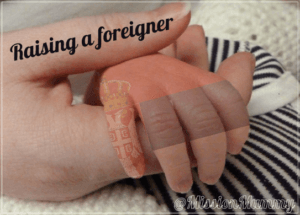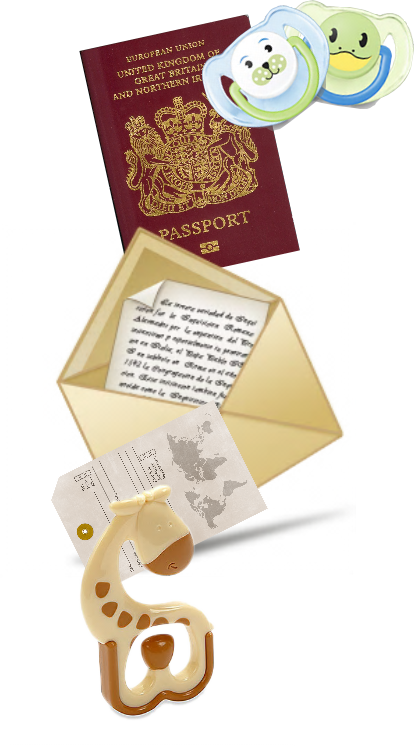Raising a ForeignerJune 30, 2018

I sat in the maternity ward watching the other mothers fuss over their new charges. Some were questioning everything, so unsure of themselves. They fretted, all of them. Fretted about feeding, burping, the rest of the family, the visits, the suddenly unfamiliar body shells, mostly the new life they had produced. I fretted too, I fretted about the delay this late delivery and yet another day in the hospital would cost, about losing a visa and having my beautiful boy being separated from one of his parents.
Every stage of parenthood has fears attached but there are some extra special ones for those of us who combine cultures. We fear that the language our child speaks will be a barrier to their relatives, that our parenting choices will be batted between conflicting medical experts and cultural expectation, that our child will not have a change to embrace our culture, that they will grow up feeling torn between worlds that could have been theirs.
When I set out on this journey I’d assumed my child would be a ‘Third Culture Kid’. TCK’s move between cultures before they have fully come to develop a cultural identity, they end up with some sort of amalgamation of their parents and host cultures, an unidentifiable third. Most missionary kids are a form of TCK, even pastors kids, like me, can get counted in this category if we are being generous. As time has passed and we have settled the realisation has come that I’m wrong. Our child will, more likely, be a cross culture kid. While he’ll grow up with significant influence from the British culture he’ll identify as Serbian, experience life in Serbia, share social norms and quite likely expectations with Serbian culture. In Serbia is where he’ll get that notion of belonging, the cultural identity will be formed with his Serbian peers as the years pass and his British-ness will always be a foreign cousin.
I’m effectively raising a foreigner.
Having a fixed culture isn’t a negative thing, in some ways I’m giving my child an experience I never had and part of me always longed for. I’ve come to realise I’d rather he identified as Serbian. I’m blessed with an equal claim to Scottish as to English, but I’ll never claim to be Scottish, in some ways it would be an insult to my cousins to do so. I’m not abandoning my heritage with those words, but acknowledging it is heritage and not present identity. I want the same for my child.
I’ve met those who’s primary identity is with their parents heritage rather than the one that shaped their formative years. While I love their commitment to recognise their history, it always felt like they were confusing heritage and cultural. They try so badly to retain a closeness to something they are not physically part of, they overdose on traditional foods, dress and celebrations believing it keeps them connected. Sadly, when they travel to that ‘homeland’ they are treated like foreigners – because in essence they are. Cultural identity is more than just heritage, it’s about the shared experience and that can’t come without being in the crowd when it happens.
He will belong in the culture even though all his DNA may not have all originated here. His mother, on the other hand, will never belong. She will always be alien in this land no matter how much she integrates. It leaves me walking an odd line, one that respects my cultural outlook and acknowledges the need to explain and pass that on, while bowing to the need for my child to feel belonging in a place I won’t. This precious little hand could only touch my culture like a tourist, but even if that is all I get I’ll cling to it. To overplay his Britishness would be to pass that disconnect, with all it’s discomfort, onto him… and which mother looks longingly at their newborn and wishes for that?
Linking to Velvet ashes : The Grove: Citizenship


I’ve always thought of my [potential] children as 2.5CKs (or even 1.5CKs). They’re basically Guatemalans with this weird American mother who has the family celebrate things like Thanksgiving and makes apple pies instead of cakes for birthdays. (Not an American tradition, but my Guatemalan husband loves apple pie after I made it for him once; so we use it for birthdays.)
Many culture kids sounds good. I love how family traditions take little elements from our culture and twist them into something uniquely us. Thanks for sharing Annalisa.
Hey, thanks for this! I think I’m in a similar family situation to you so I enjoyed it. This week VA is on belonging, this post would also fit, although I see you wrote it for a previous word prompt. I only recently started reading TCK books, as previously I thought they weren’t really relevant to me but now I’m finding they are, even if my kids aren’t technically traditional TCKs, I don’t think anyone has written a book on our particular cross cultural kid subset yet!
I’ve found a few books on the cross cultural experience but I agree they are thin on the ground. I just peeked over at your blog, looks good. I’m facilitating a new VA connection group this fall, but my old spring group is still going and about to embark on working through the ‘love across latitudes’ workbook – which is specifically for those in cross cultural situations. I also found, while a touch shallow, the book “Bringing Up Brits” had quite a nice overview on this idea of raising a foreigner.